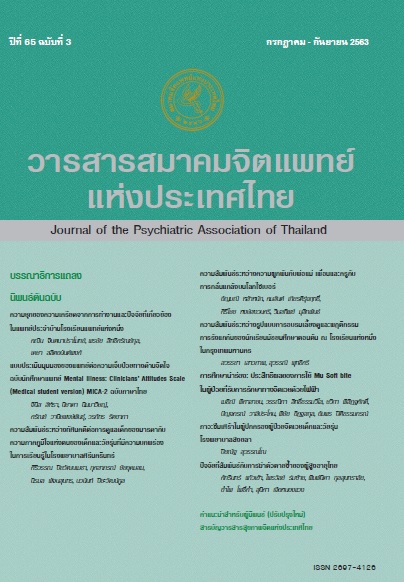Occupational Stress and related factors among medical residents at a medical school
Main Article Content
Abstract
Abstract
Objective: To examine the prevalence of occupational stress and related factors among medical residents at a medical school.
Method: This cross-sectional descriptive study was to examine the prevalence of occupational stress and related factors among medical residents at a medical school in Thailand academic year 2019, data was collected by self-administered electronic questionnaires from 298 residents,143 males and 155 females, aged between 25 and 37 years (mean 28.54 years). The questionnaire data were composed of personal factors, occupational related factors and Thai JCQ (Thai Job Content Questionnaire), analyzed using descriptive statistics including average, frequency, percentage, and standard deviation, and using bivariate statistics including Pearson's Chi Square, Fisher Exact Test and Independent t-test; then avoided multicollinearity and analyzed the prevalence of different types of stress using Binary Logistic Regression statistics.
Results: Results revealed 29.53% of the residents had occupational stress. The risk factors associated with occupational stress include having a history of psychiatric condition or disease, major wards specialty, high physical workload and idea of resident program resignation. The protective factors associated with occupational stress include high social support and higher academic year.
Conclusion: Understanding occupational stress among medical residents should be used to improve residency training programs. In addition, this may be integrated into a part of recruitment process of new residents.
Article Details
Articles submitted for consideration must not have been previously published or accepted for publication in any other journal, and must not be under review by any other journal.
References
Reuben DB. Depressive symptoms in medical house officers. Arch Inter Med 1985;145:286-8.
Benjaponpitak A. Mental Health Problems in Residents at Ramathibodi Hospital. J Psychiatr Assoc Thailand 1996;41:87-98.
Pitanupong J, Sangkool J. Thought of Dropping Out of Residency Trainingand the Associated Factors among Residentsin Songklanagarind Hospital. Journal of the Psychiatric Association of Thailand 2017;62(3):211-22.
The National Institute for Occupational Safety and Health. Stress at work [Internet]. Ohio; [cited on 10 October 2018]. Available from https://www.cdc.gov/niosh/docs/99-101/pdfs/99-101.pdf?id=10.26616/NIOSHPUB99101
Jex S, Kain J. Karasek's job demands-control model: A summary of current issues and recommendations for future research. New Developments in Theoretical and Conceptual Approaches to Job Stress. Research in Occupational Stress and wellbeing 2010;8:237-68.
Van DM, Maes S. The Job Demand–Control (–Support) Model and psychological well-being: a review of 20 years of empirical research. Work Stress 1999;13: 87–114.
Karasek R, Brisson C, Kawakami N, Houtman I, Bongers P, Amick B. The Job Content Questionnaire (JCQ): an instrument for internationally comparative assessments of psychosocial job characteristics. J Occup Health Psychol 1998;3:322-55.
Phakthongsuk P. Construct validity of the Thai version of the joc content questionnaire in a large population of heterogeneous occupations . J Med Assoc Thai 2009;92:564-72.
Phakthongsuk P. Apakupakul N. Psychometric Properties of the Thai version of the 22-item and 45-item Karasek Job Content Questionnaire. Inter J Occup med Environ Health 2008;21:1-14.
Janthanasansombat P, Kasantikul D. Prevalence of stress and factors correlated with stress among residents in training in King Chulalongkorn Memorial Hospital [Dissertation]. Bangkok: Chulalongkorn University; 2002.
Yamane, Taro. Statistics, An Introductory Analysis. 2nd edition. New York:Harper and Row Publishing,1967.
Chuesathuchon N, Hengpraprom S, Lohsoonthorn V. The prevalence and factors associated stress among the medical intern [Dissertation]. Bangkok: Chulalongkorn University; 2013.
Wongwan T, Supapong S, Kanchanatawan B. Prevalence and Related Factors of Occupational Stress among Correctional Officers in Maximum Security Prisons. Buddhachinaraj Medical Journal 2015: 32(1); 25-33.
Therdthoonphuphuch Sh. W, Lueboonthavatchai P. Work stress and burnout among licensed lawyers at Thai Lawyers Council under Royal Patronage. Chula Med J 2017;61(5): 663–76.
Siangpror P, Rawiworrakul T, Kaewboonchoo O. Factors correlated to job stress among nurses in specialised cancer hospitals, central region of Thailand. Journal of Health Science Research 2014;8(1): 17-27.
Reuben DB. Depressive symptoms in medical house officers. Arch Inter Med 1985 ; 145 : 286-8.
Choi S-M, Park YS, Yoo J-H, Kim G-Y. Occupational Stress and Physical Symptoms among Family Medicine Residents. Korean Journal of Family Medicine 2013;34(1):49.
Robert L. Sources of Stress for Residents and Recommendations for Programs to Assist Them. Academia Medicine 76(2):142–50


